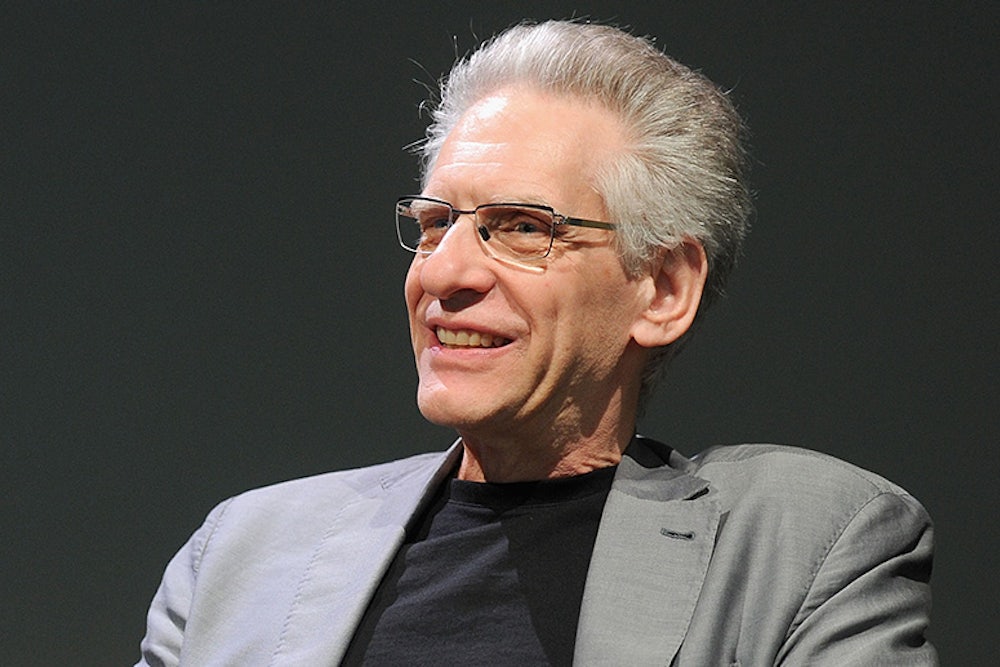On the evidence of this superb debut novel and his last two films (the overegged Cosmopolis and the curate’s egg that is Maps to the Stars), David Cronenberg should quit his day job. Why persist in the unrewarding business of trying to make semi-interesting movies when you could switch to writing more-than-interesting books?
Cosmopolis was a star vehicle whose vehicle was the real star. I saw it in 2012 when it came out and all that remains in my memory is Robert Pattinson, looking suitably shamefaced at his unlikely gorgeousness, seated in the back of a super-charismatic limousine, while—rather like in Elvis Costello’s “I Wanna Be Loved” video—various characters get in, do things to, for and with him, then leave. The gloss of it passed before my eyes and slicked out of my brain.
Maps to the Stars frantically aspires to be half a dozen other films. In descending order of yearning: Chinatown, Sunset Boulevard, Magnolia, The Royal Tenenbaums, The Player and Ivans Xtc. Despite pedal-to-the-floor performances from Olivia Williams and Julianne Moore, it is comprised almost entirely of not-quite moments. I’m pretty sure that all I’ll remember of it in two years’ time will be the yucky bit in which a major character is bludgeoned to death with a statuette that is quite clearly not meant to be an Oscar, OK? Because it’s ironic!
Consumed, however, is a subtler and more interesting work. It doesn’t read as a novel by a man who has spent most of his life writing screenplays—except, perhaps, that it reacts in the opposite direction, towards an art-house pacing that in Hollywood is shorthanded as “European.” The scenes here are not snappy or snatched; instead they unspool with a fully novelistic languor. They don’t end on a “button”—a neat, witty, bringing-it-all-together line. The overall action feels as if it were condensed from life rather than expanded from a treatment. There is more than enough body horror in Consumed to satisfy fans of Cronenberg’s The Fly or Videodrome but at its core is a nuanced and moving examination of what it means to age, to become ill and to die in a rampantly technologised age.
I’ve never written a book review in which I’ve quite so much wanted to include an animated graphic, but you’ll just have to imagine this: A and B are two points at diametrically opposite edges of the circumference of a circle. As A starts to move clockwise towards B, so B—at the same speed—starts to move towards A.
A and B are, in Consumed, Naomi and Nathan, two very contemporary journalists—or, as Cronenberg has it, “parajournalists.” That is, journalists who become so embedded with their sources that they start to collaborate with them, in an act of mutual fictionalisation. Naomi’s quest, at least to begin with, is to investigate the apparent cannibalistic murder of the radical French philosopher Célestine Arosteguy by her long-time husband, Aristide. Nathan’s investigation is of an eccentric, amoral surgeon (reminiscent of William Burroughs’s Dr. Benway) who performs illegal and perverse operations. After contracting a rare STD from one of the surgeon’s patients (parajournalists could also be defined as “journalists who always shag their sources”), Nathan decides to investigate the doctor who named this STD. As they circle the globe in pursuit of their stories, remaining mostly equidistant, A and B find very soon that they are chasing one another’s tails. Everything and everyone is interconnected. In this, Cronenberg’s global village is strangely like Thomas Hardy’s Wessex—if there’s a tramp in a ditch, it’s the same tramp every time.
Once you’ve been given the elements of author, title, cannibalism and consumerism, you could sketch in about 50 percent of this novel yourself. Brand names on every page. Strange characters going around saying, “Diagnose me.” Oral fixation metaphors. The expected literary influences are also in evidence: authors whose work (Burroughs’s Naked Lunch, J G Ballard’s Crash, Don DeLillo’s Cosmopolis) Cronenberg has adapted.
What you couldn’t anticipate, though, is just how exquisitely Cronenberg writes. There isn’t a duff, hurried sentence here. Nor could you second-guess the tender complexity of the book’s innermost relationship—that between the husband and the beloved wife he is supposed to have consumed. Aristide watches over Célestine, who is convinced that her left breast is infested with insects:
What husband has not avidly played the role of voyeur in his own house, watching the reflections of his wife in a window as she examines her vagina or anus with his chromed shaving mirror, one leg propped up on the white metal bathroom chair, searching for some real or feared lesion . . . or telltale discolouration? I would often catch Célestine examining her left breast in the most unconventional way: for sound, rather than sight. She would pull it up towards her left ear, her head cocked, manipulating it ruthlessly, as though it truly did not belong to her but was a ludicrously wrongheaded transplant . . . prodding it in order to provoke the insects into an aural frenzy loud enough to be recordable by the iPhone that sat propped up against a Kleenex box . . .
Consumed may not be to everyone’s taste but, for connoisseurs of Burroughs, Ballard and DeLillo, it’s a delightful and unexpected smorgasbord.
This piece originally appeared at newstatesman.com.
